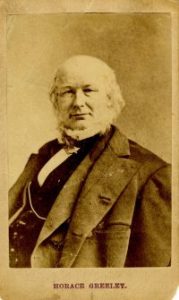
Born the third of 7 children to Amherst, NH farmers, Horace Greeley displayed signs of intellectual curiosity and aptitude by the age of 4. Within two years, the boy declared career aspirations of becoming a printer, a desire driven by his passion for reading and learning. Although Greeley’s formal education ended at 13 when his teacher informed Greeley’s parents the child knew more than the educator, the future editor forged ahead.
While apprenticing at the Northern Spectator as a typesetter and editorial assistant, beginning in 1826, the teenager participated in talks and debates at the East Poultney, Vermont’s lyceum an discussing political topics with local officials and Congressmen. By the time Greeley was 21, he was absorbed in politics and moved to New York City with $10 in his pocket. Furthering his printing aspirations, the young man worked at several publishers and publications before becoming a stereotype compositor at J.S. Redfield’s Spirit of the Times in 1833. Later that year, Greeley was involved in the short-lived Morning Post (1833), which heralded the beginning of the penny paper and newsboys.
Greeley also founded and became the editor of The New Yorker (1834-1841) while also writing and editing for other small newspapers. The New Yorker’s focus was literary matter, editorial, and political news. In spite of popularity, the paper was unprofitable. After the closure of The New Yorker, Greeley founded the New-York Daily Tribune (1841-1966; renamed New York Tribune in 1866). The editor’s own literary accomplishments include 35 poems published in periodicals such as The New Yorker and the Southern Literary Messenger.
Based on letters from Henry David Thoreau to R.W. Emerson and Helen Thoreau, the young scholar met Greeley in the between 8 July and 21 July 1843, while H.D. Thoreau was living in Staten Island as a tutor for Emerson’s nephew. In the 21 July letter to his sister Helen, Thoreau writes:
Also Horace Greeley Editor of the Tribune—who is cheerfully in earnest.—at his office of all work—a hearty New Hampshire boy as one would wish to meet. And says “now be neighborly”—and believes only or mainly, first, in the Sylvania Association somewhere in Pennsylvania—and secondly and most of all, in a new association to go into operation soon in New Jersey, with which he is connected.
Known correspondence between the two men runs from 1846-1860. Greeley was one of Thoreau’s literary agents, sending essays to other publications, obtaining payment for Thoreau’s work and Greeley’s efforts, and promoting the younger author with editorials and comments on Thoreau’s contributions to The Dial.
On 26 Aug. 1846, Greeley forwarded Thoreau’s essay “Thomas Carlyle and His Works” to George Rex Graham publisher of Graham’s Magazine, calling the work “a brilliant as well as vigorous essay” (Correspondence and Other Papers of Rufus W. Griswold, 206-207). Following up with Thoreau a month later, Greeley writes that Griswold, editor of Graham’s Magazine promised to pay Thoreau for the essay, which appeared in two parts in the March and April 1847 issues. More than a year passed before Thoreau was paid $25 for the work.
Expressing appreciation for Greeley’s assistance in a letter dated 19 May 1848, Thoreau writes, “My Friend Greeley, I know not how to thank you for your kindness—to thank you is not the way—I can only assure you that I see and appreciate it—To think that while I have been sitting comparatively idle here, you have been so active in my behalf!” Impressed, Greeley published an excerpt of Thoreau’s private letter in an editorial, “A Lesson for Young Poets,” in the 25 May 1848 issue of the New-York Daily Tribune:
We are continually receiving letters from young gentlemen who deem themselves born to enlighten the world in some way—to “strike the sounding lyre,” or from the Editorial tripod dispense wisdom and guidance to an instructed and admiring world. These generally want to know why they cannot be employed in our establishment, or find a publisher for their poems, or a chance in some shape to astonish mankind and earn a livelihood by letters.—To this large and increasing class, we wish to propound one question: “Suppose all who desire to live by Literature or Trade could find places, who would hoe the needful corn or dig the indispensible potatoes?”—But we purposed in beginning to ask their attention to the following extract from a private letter we have just received from a very different sort of literary youth—a thorough classical scholar, true poet (though he rarely or never wrote verses,) and never sought to make a livelihood by his writings, though there are not six men in America who can surpass them. We feel indeed honored by his friendship . . .
From being sworn in as a Congressman in the U.S. House of Representatives on 4 Dec. 1848, and serving for three tumultuous months, through the 1872 Presidential Campaign, Greeley was heavily involved in politics while continuing his work with Thoreau. Within weeks of losing his wife of 36 years, Mary Y. (Cheney) (circa 1811-1872), and losing the general election, Greeley died in Pleasantville, NY, and was laid in state at City Hall where his body was viewed by over 50,000 people, including the Pres. and Vice Pres. of the United States. Horace and Mary Greeley were survived by 2 of their 7 children.
Greeley died 29 November 1872 and is buried in Greenwood Cemetery in Brooklyn, NY.
Margaret Fuller (from Recollection of a Busy Life) by Horace Greeley

